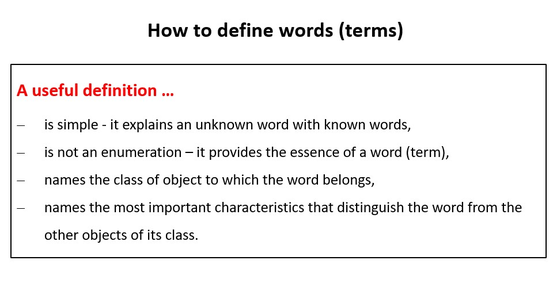How to define words (terms) - features of a definition
Key massage: The definition of a word states the class to which the word belongs and the essential characteristics that distinguish it from the other words in the class. Of important words, we should know the exact definition.
How to define a word (a term)?
Purdue’s Online Writing Lab says (https://owl.purdue.edu/owl/general_writing/common_writing_assignments/definitions.html, 12/31/20):
"A formal definition is based upon a concise, logical pattern that includes as much information as it can within a minimum amount of space. ... A formal definition consists of three parts:
- The term (word or phrase) to be defined
- The class of object or concept to which the term belongs
- The differentiating characteristics that distinguish it from all others of its class"
Socrates and Aristotle say that a definition should describe the essentials (the most important) of a term.
In a conversation with Socrates, Theaetetus (a young mathematician) makes a first attempt to define the word "knowledge".
"Socrates raises objections to this definition. ... the definition is only an enumeration; instead of getting to the essence of knowledge, it lists only instances of knowledge." (www.claus-beisbart.de/teaching/wi2005/epi/epi2.pdf, 08/01/21)
So a definition is not an enumeration, but it names the "distinguishing features" from other objects. In other words: A definition names the most important conditions which must be met so that an object can be designated by the word (term).
A definition
corresponds to a logical conclusion: If something belongs to the generic term X and has the characteristics A and B, then it is a ... .
"Inference is a movement of thought that enables us to move from one or more assertions, statements or propositions asserted as true, called premises, to a new assertion which is the conclusion1." (https://fr.wikipedia.org/wiki/Inf%C3%A9rence_(logique), 06/11/24)
Example: the definition of science
If knowledge is new
(1st premise), reproducible (2nd premise), and useful (3rd premise), then it is "science" (conclusion). (See on Learn-Study-Work "What is
Science?")
A definition is only useful if it is simple. It cannot take into account all possible exceptions (exceptions confirm the rule). Exceptions do not matter if the definition is the most useful compared to other definitions.
"Yet, most human concepts characterising objects in the real world and our activities in it are flexible, as thex have fluid, imprecisely defined boundaries and context-dependent meaning. Note how difficult it is to define precisely concepts such as chair, key, space, game, freedom, mechanism or the like, that we regularily use in our communication." (www.mli.gmu.edu/papers/91-95/90-11.pdf, 01/23/24, p. 2-3)
There are only "optimal" definitions, not "perfect" ones. A "perfect" definition would at the same time be simple and take into account all possible exceptions.
"Only the fittest theories [definitions] survive. Although it can never be legitimately said of a theory [definition] that it is true [perfect], it can hopefully be said that it is the best available …" (Chalmers, A. F. (1999). What Is This Thing Called Science? Open University Press, page 60)
A definition must satisfy another condition:
"A definition is the explanation of a previously unknown word with a combination of at least two previously known words." (Seffert , H. (1997) Einführung in die Wissenschaft. München: Beck Verlag, p. 49)
It makes no sense to use unknown words to define a term. If an unknown word is used in a definition, it has to be defined (explained) afterwards.
Definition: A definition is a rule that ...
- is simple - it explains an unknown word with known words,
- is not an enumeration - it describes the essence of a word (term),
- names the class of object the word belongs to,
- names the most important characteristics that distinguish the word (term) from the other objects of its class.
If one criterion is not met, it is not a definition.
Each person can define words or terms as they want. For example, you can write: "In this text I use the word ... according to the definition ..." But a definition should correspond to the language that people use in their everyday lives.
Example: In everyday life, almost all people understand the word "stress" as something negative: "Don't stress me!" But there are scientists who say that stress can also be positive. In my opinion, this destroys the meaning of the word "stress". People no longer know whether negative or positive stress is meant by this word and people don't know where the line is between negative and positive stress.. If I want to say, "People need positive stress," then I would phrase it as, "People need challenges." A definition of stress that means "positive stress" does not seem to make sense to me.

The most important features of a good definition
ChatGPT gives an answer which I have modified (for the original answer see https://chatgpt.com/s/t_68c69d4e82208191a80e77c127b21cc7, 09/15/25)
- Structure: A definition names the next higher generic term and all necessary (and jointly sufficient) properties that distinguish the term from the other terms within that genus (proximal genus + specific differentia).
- Clarity and brevity: Uses unambiguous and well-known terms, containing only necessary components.
- Testability: Makes statements that can be empirically verified.
- Non-circularity: The definition does not use the term being defined or its synonyms.
- Positive formulation: Describes what something is and not what it is not. Only if there are very important exceptions are these mentioned in the definition. For the sake of brevity, minor exceptions are omitted.
Read on Learn-Study-Work "What is Science?", "What is Respect?", "How to respond to disrespect", "How to write a text", "How to solve problems", "What is Health?", "How to learn", "How to study", "What are Scientific Methods?"
en français: "Qu'est-ce que le respect ?", "Comment réagir à un comportement irrespectueux ?", "Comment écrire un texte ?"
en español: "¿Qué es el respeto?", "¿Como responder a la falta de respeto?"
हिंदी भाषा में: आदर क्या है ?"
बंगाली बंगाली में: "সম্মান কি ?"
